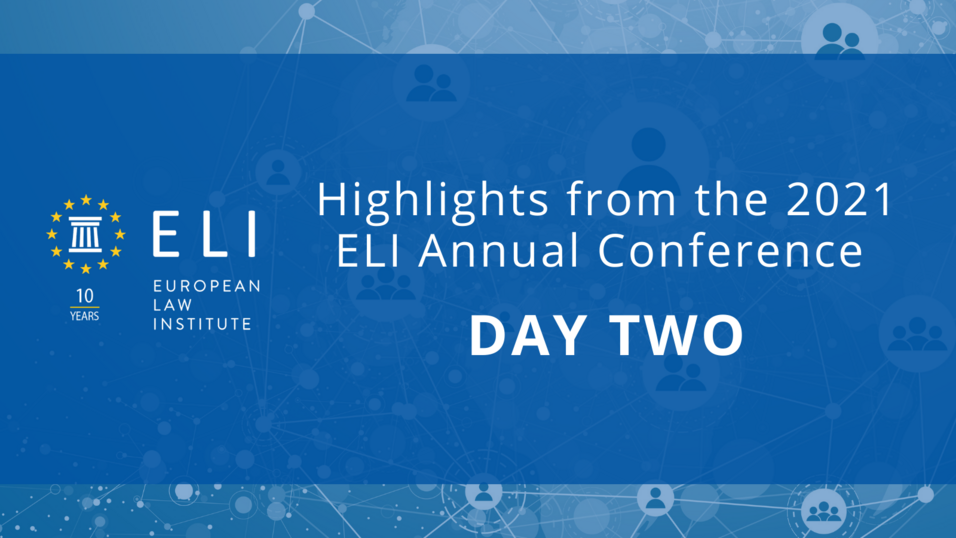During the first session on Blockchain Technology and Smart Contracts, Sjef van Erp (Chair; Project Co-Reporter; Emeritus Professor of Civil Law and European Private Law at Maastricht University), Martin Hanzl (Project Co-Reporter, associate at Pelzmann Gall Größ Rechtsanwälte GmbH (EY Law)), Marina Niforos (Affiliate Professor at HEC Business School), Claudia Sandei (Associate Professor of Company Law and IT Law at the University of Padua) and Dirk Staudenmayer (Head of Unit for Contract Law of the DG Justice and Consumers at the European Commission) discussed the draft ELI Principles on the legal governance of blockchains and smart contracts, which aim to provide guidance to judges, practitioners and policy makers in the field, as well as recent developments in the field. The presentations sparked lively discussions, during which, among other things, compliance with consumer law in the blockchain context and recent EU initiatives were discussed.
The following webinar focused on the Artificial Intelligence (AI) and Public Administration – Developing Impact Assessments and Public Participation for Digital Democracy project. Paul Craig (Chair; Project Co-Reporter; Emeritus Professor of English Law at St John's College at Oxford University), Brando Benifei (Member of the European Parliament, Rapporteur for the Artificial Intelligence Act), Marc Clément (Project Co-Reporter; Presiding Judge at the Administrative Tribunal of Lyon), Jens-Peter Schneider (Project Co-Reporter; Professor of Public Law at Freiburg University) and Peggy Valcke (Vice-Chair of the Council of Europe Ad hoc Committee on Artificial Intelligence (CAHAI); Professor at KU Leuven) discussed developments regarding the use of AI in public administration in Europe. The ELI, EU and Council of Europe initiatives on the matter were presented and panellists reflected on commonalities as well as differences in the respective approaches.
A panel on Admissibility of E-Evidence in Criminal Proceedings in the EU then took place. Lorena Bachmaier Winter (Chair; Full Professor at the Complutense University in Madrid) presented the progress of the eponymous ELI project with a focus on electronic-evidence and other evidence. She was followed by Farsam Salimi (Associate Professor at the University of Vienna), who spoke about general requirements of a new legislative measure in this filed, in particular the question of which areas any future harmonisation should focus on. Vânia Costa Ramos (defense lawyer at Carlos Pinto de Abreu e Associados, Portugal) shared her perspective on the project and spoke about challenges for defence rights in connection with the admissibility of e-evidence. Tania Schröter (Deputy Head of Unit, Procedural Criminal Law Unit (B2), DG JUST, European Commission) provided an overview of the latest developments at EU level, in particular on the E-DES (Electronic Digital Exchange System).
The Concept and the Role of Courts in Family and Succession Matters was the next ELI project presented. The Assessor of the project, Matthias Neumayr (Chair; Judge at the Austrian Supreme Court; Professor of Law at the University of Salzburg’s Department of Private Law), explained the recent trend of so-called ‘de-judicialisation’ in the field of family and succession law, raising the question under which conditions and to what extent the regime of judicial activities may be conducted by non-judicial bodies and by out-of-court proceedings. The Project Co-Reporter Elena Bargelli (Professor of Private Law and Family Law at the University of Pisa), briefly joined by the Co-Reporter François Trémosa (Notary), addressed the question giving a comparative overview of the extent of non-judicial practises across European countries, the applicable regulations and case law as well as an outline for a more harmonised approach. Véronique Chauveau (Lawyer at the Paris Bar) discussed further problematic aspects of ‘de-judicialisation’, for instance, the recognition of out-of-court proceedings for international couples, while Andreas Stein (Head of Unit, Civil Justice, Directorate-General for Justice and Consumers, European Commission) provided a detailed insight into the drafting process of EU legislation, which aims at legal certainty and consistency.
The final webinar of the day focused on the prospective ELI project on Climate Justice – New Challenges for Law and Judges. Project co-proposer Henrik Andersen (Chair; Associate Professor of International Economic Law at Copenhagen Business School) briefly presented the idea behind the prospective project. Larisa Alwin (Judge, Amsterdam Court of Appeal) provided remarks on establishing a duty of care for states and corporations in climate litigation. Lavanya Rajamani (Professor of International Environmental Law at the University of Oxford) focused on the role of courts in international climate change law. Gerhard Wagner (Professor of Civil Law, Economic Law, and Economics at Humboldt University) addressed, among other things, judicial activism and the issue of unilateral action by states or corporations against climate change. Tim Eicke (Judge of the European Court of Human Rights (ECtHR)) provided insight into some of the challenges that the ECtHR will face in climate litigation. This was followed by a Q&A session with attendees. Alberto De Franceschi (Full Professor of Private law, Intellectual Property Rights and Environmental Law at the University of Ferrara) closed the webinar by emphasising, in his final remarks, that several gaps in tackling climate change were identified – the ambition gap, the accountability gap and the fairness gap.
The second day ended with the ELI Young Lawyers Award and well as the SIG and Hub of the Year Awards.
Webinar recordings from the second day are available below.

